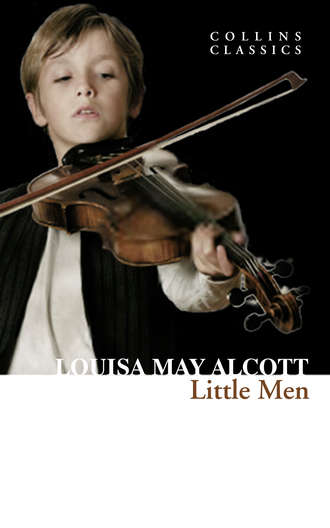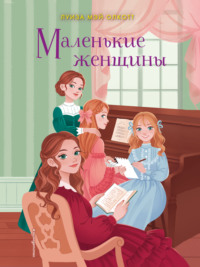
Полная версия
Little Men: Life at Plumfield with Jo’s Boys
As he looked about him Nat thought it seemed more like a great family than a school, for the lads were sitting in a wide half-circle round the fire, some on chairs, some on the rug, Daisy and Demi on the knees of Uncle Fritz, and Rob snugly stowed away in the back of his mother’s easy-chair, where he could nod unseen if the talk got beyond his depth.
Every one looked quite comfortable, and listened attentively, for the long walk made rest agreeable, and as every boy there knew that he would be called upon for his views, he kept his wits awake to be ready with an answer.
“Once upon a time,” began Mr. Bhaer, in the dear old-fashioned way, “there was a great and wise gardener who had the largest garden ever seen. A wonderful and lovely place it was, and he watched over it with the greatest skill and care, and raised all manner of excellent and useful things. But weeds would grow even in this fine garden; often the ground was bad and the good seeds sown in it would not spring up. He had many under gardeners to help him. Some did their duty and earned the rich wages he gave them; but others neglected their parts and let them run to waste, which displeased him very much. But he was very patient, and for thousands and thousands of years he worked and waited for his great harvest.”
“He must have been pretty old,” said Demi, who was looking straight into Uncle Fritz’s face, as if to catch every word.
“Hush, Demi, it’s a fairy story,” whispered Daisy.
“No, I think it’s an arrygory,” said Demi.
“What is a arrygory?” called out Tommy, who was of an inquiring turn.
“Tell him, Demi, if you can, and don’t use words unless you are quite sure you know what they mean,” said Mr. Bhaer.
“I do know, Grandpa told me! A fable is a arrygory; it’s a story that means something. My ‘Story without an end’ is one, because the child in it means a soul; don’t it, Aunty?” cried Demi, eager to prove himself right.
“That’s it, dear; and Uncle’s story is an allegory, I am quite sure; so listen and see what it means,” returned Mrs. Jo, who always took part in whatever was going on, and enjoyed it as much as any boy among them.
Demi composed himself, and Mr. Bhaer went on in his best English, for he had improved much in the last five years, and said the boys did it.
“This great gardener gave a dozen or so of little plots to one of his servants, and told him to do his best and see what he could raise. Now this servant was not rich, nor wise, nor very good, but he wanted to help because the gardener had been very kind to him in many ways. So he gladly took the little plots and fell to work. They were all sorts of shapes and sizes, and some were very good soil, some rather stony, and all of them needed much care, for in the rich soil the weeds grew fast, and in the poor soil there were many stones.”
“What was growing in them besides the weeds, and stones?” asked Nat; so interested, he forgot his shyness and spoke before them all.
“Flowers,” said Mr. Bhaer, with a kind look. “Even the roughest, most neglected little bed had a bit of heart’s-ease or a sprig of mignonette in it. One had roses, sweet peas, and daisies in it,” here he pinched the plump cheek of the little girl leaning on his arm. “Another had all sorts of curious plants in it, bright pebbles, a vine that went climbing up like Jack’s beanstalk, and many good seeds just beginning to sprout; for, you see, this bed had been taken fine care of by a wise old man, who had worked in gardens of this sort all his life.”
At this part of the “arrygory,” Demi put his head on one side like an inquisitive bird, and fixed his bright eye on his uncle’s face, as if he suspected something and was on the watch. But Mr. Bhaer looked perfectly innocent, and went on glancing from one young face to another, with a grave, wistful look, that said much to his wife, who knew how earnestly he desired to do his duty in these little garden plots.
“As I tell you, some of these beds were easy to cultivate, that means to take care of Daisy, and others were very hard. There was one particularly sunshiny little bed that might have been full of fruits and vegetables as well as flowers, only it wouldn’t take any pains, and when the man sowed, well, we’ll say melons in this bed, they came to nothing, because the little bed neglected them. The man was sorry, and kept on trying, though every time the crop failed, all the bed said, was, ‘I forgot.’”
Here a general laugh broke out, and every one looked at Tommy, who had pricked up his ears at the word “melons,” and hung down his head at the sound of his favorite excuse.
“I knew he meant us!” cried Demi, clapping his hands. “You are the man, and we are the little gardens; aren’t we, Uncle Fritz?”
“You have guessed it. Now each of you tell me what crop I shall try to sow in you this spring, so that next autumn I may get a good harvest out of my twelve, no, thirteen, plots,” said Mr. Bhaer, nodding at Nat as he corrected himself.
“You can’t sow corn and beans and peas in us. Unless you mean we are to eat a great many and get fat,” said Stuffy, with a sudden brightening of his round, dull face as the pleasing idea occurred to him.
“He don’t mean that kind of seeds. He means things to make us good; and the weeds are faults,” cried Demi, who usually took the lead in these talks, because he was used to this sort of thing, and liked it very much.
“Yes, each of you think what you need most, and tell me, and I will help you to grow it; only you must do your best, or you will turn out like Tommy’s melons, all leaves and no fruit. I will begin with the oldest, and ask the mother what she will have in her plot, for we are all parts of the beautiful garden, and may have rich harvests for our Master if we love Him enough,” said Father Bhaer.
“I shall devote the whole of my plot to the largest crop of patience I can get, for that is what I need most,” said Mrs. Jo, so soberly that the lads fell to thinking in good earnest what they should say when their turns came, and some among them felt a twinge of remorse, that they had helped to use up Mother Bhaer’s stock of patience so fast.
Franz wanted perseverance, Tommy steadiness, Ned went in for good temper, Daisy for industry, Demi for “as much wiseness as Grandpa,” and Nat timidly said he wanted so many things he would let Mr. Bhaer choose for him. The others chose much the same things, and patience, good temper, and generosity seemed the favorite crops. One boy wished to like to get up early, but did not know what name to give that sort of seed; and poor Stuffy sighed out,
“I wish I loved my lessons as much as I do my dinner, but I can’t.”
“We will plant self-denial, and hoe it and water it, and make it grow so well that next Christmas no one will get ill by eating too much dinner. If you exercise your mind, George, it will get hungry just as your body does, and you will love books almost as much as my philosopher here,” said Mr. Bhaer; adding, as he stroked the hair off Demi’s fine forehead, “You are greedy also, my son, and you like to stuff your little mind full of fairy tales and fancies, as well as George likes to fill his little stomach with cake and candy. Both are bad, and I want you to try something better. Arithmetic is not half so pleasant as ‘Arabian Nights,’ I know, but it is a very useful thing, and now is the time to learn it, else you will be ashamed and sorry by and by.”
“But, ‘Harry and Lucy,’ and ‘Frank,’ are not fairy books, and they are all full of barometers, and bricks, and shoeing horses, and useful things, and I’m fond of them; ain’t I, Daisy?” said Demi, anxious to defend himself.
“So they are; but I find you reading ‘Roland and Maybird,’ a great deal oftener than ‘Harry and Lucy,’ and I think you are not half so fond of ‘Frank’ as you are of ‘Sinbad.’ Come, I shall make a little bargain with you both, George shall eat but three times a day, and you shall read but one story-book a week, and I will give you the new cricket-ground; only, you must promise to play in it,” said Uncle Fritz, in his persuasive way, for Stuffy hated to run about, and Demi was always reading in play hours.
“But we don’t like cricket,” said Demi.
“Perhaps not now, but you will when you know it. Besides, you do like to be generous, and the other boys want to play, and you can give them the new ground if you choose.”
This was taken them both on the right side, and they agreed to the bargain, to the great satisfaction of the rest.
There was a little more talk about the gardens, and then they all sang together. The band delighted Nat, for Mrs. Bhaer played the piano, Franz the flute, Mr. Bhaer a bass viol, and he himself the violin. A very simple little concert, but all seemed to enjoy it, and old Asia, sitting in the corner, joined at times with the sweetest voice of any, for in this family, master and servant, old and young, black and white, shared in the Sunday song, which went up to the Father of them all. After this they each shook hands with Father Bhaer; Mother Bhaer kissed them every one from sixteen-year-old Franz to little Rob, how kept the tip of her nose for his own particular kisses, and then they trooped up to bed.
The light of the shaded lamp that burned in the nursery shone softly on a picture hanging at the foot of Nat’s bed. There were several others on the walls, but the boy thought there must be something peculiar about this one, for it had a graceful frame of moss and cones about it, and on a little bracket underneath stood a vase of wild flowers freshly gathered from the spring woods. It was the most beautiful picture of them all, and Nat lay looking at it, dimly feeling what it meant, and wishing he knew all about it.
“That’s my picture,” said a little voice in the room. Nat popped up his head, and there was Demi in his night-gown pausing on his way back from Aunt Jo’s chamber, whither he had gone to get a cot for a cut finger.
“What is he doing to the children?” asked Nat.
“That is Christ, the Good Man, and He is blessing the children. Don’t you know about Him?” said Demi, wondering.
“Not much, but I’d like to, He looks so kind,” answered Nat, whose chief knowledge of the Good Man consisted in hearing His name taken in vain.
“I know all about it, and I like it very much, because it is true,” said Demi.
“Who told you?”
“My Grandpa, he knows every thing, and tells the best stories in the world. I used to play with his big books, and make bridges, and railroads, and houses, when I was a little boy,” began Demi.
“How old are you now?” asked Nat, respectfully.
“’Most ten.”
“You know a lot of things, don’t you?”
“Yes; you see my head is pretty big, and Grandpa says it will take a good deal to fill it, so I keep putting pieces of wisdom into it as fast as I can,” returned Demi, in his quaint way.
Nat laughed, and then said soberly,
“Tell on, please.”
And Demi gladly told on without pause or punctuation. “I found a very pretty book one day and wanted to play with it, but Grandpa said I mustn’t, and showed me the pictures, and told me about them, and I liked the stories very much, all about Joseph and his bad brothers, and the frogs that came up out of the sea, and dear little Moses in the water, and ever so many more lovely ones, but I liked about the Good Man best of all, and Grandpa told it to me so many times that I learned it by heart, and he gave me this picture so I shouldn’t forget, and it was put up here once when I was sick, and I left it for other sick boys to see.”
“What makes Him bless the children?” asked Nat, who found something very attractive in the chief figure of the group.
“Because He loved them.”
“Were they poor children?” asked Nat, wistfully.
“Yes, I think so; you see some haven’t got hardly any clothes on, and the mothers don’t look like rich ladies. He liked poor people, and was very good to them. He made them well, and helped them, and told rich people they must not be cross to them, and they loved Him dearly, dearly,” cried Demi, with enthusiasm.
“Was He rich?”
“Oh no! He was born in a barn, and was so poor He hadn’t any house to live in when He grew up, and nothing to eat sometimes, but what people gave Him, and He went round preaching to everybody, and trying to make them good, till the bad men killed Him.”
“What for?” and Nat sat up in his bed to look and listen, so interested was he in this man who cared for the poor so much.
“I’ll tell you all about it; Aunt Jo won’t mind;” and Demi settled himself on the opposite bed, glad to tell his favorite story to so good a listener.
Nursey peeped in to see if Nat was asleep, but when she saw what was going on, she slipped away again, and went to Mrs. Bhaer, saying with her kind face full of motherly emotion,
“Will the dear lady come and see a pretty sight? It’s Nat listening with all his heart to Demi telling the story of the Christ-child, like a little white angel as he is.”
Mrs. Bhaer had meant to go and talk with Nat a moment before he slept, for she had found that a serious word spoken at this time often did much good. But when she stole to the nursery door, and saw Nat eagerly drinking in the words of his little friends, while Demi told the sweet and solemn story as it had been taught him, speaking softly as he sat with his beautiful eyes fixed on the tender face above them, her own filled with tears, and she went silently away, thinking to herself,
“Demi is unconsciously helping the poor boy better than I can; I will not spoil it by a single word.”
The murmur of the childish voice went on for a long time, as one innocent heart preached that great sermon to another, and no one hushed it. When it ceased at last, and Mrs. Bhaer went to take away the lamp, Demi was gone and Nat fast asleep, lying with his face toward the picture, as if he had already learned to love the Good Man who loved little children, and was a faithful friend to the poor. The boy’s face was very placid, and as she looked at it she felt that if a single day of care and kindness had done so much, a year of patient cultivation would surely bring a grateful harvest from this neglected garden, which was already sown with the best of all seed by the little missionary in the night-gown.
CHAPTER 4
Stepping-Stones
When Nat went into school on Monday morning, he quaked inwardly, for now he thought he should have to display his ignorance before them all. But Mr. Bhaer gave him a seat in the deep window, where he could turn his back on the others, and Franz heard him say his lessons there, so no one could hear his blunders or see how he blotted his copybook. He was truly grateful for this, and toiled away so diligently that Mr. Bhaer said, smiling, when he saw his hot face and inky fingers:
“Don’t work so hard, my boy; you will tire yourself out, and there is time enough.”
“But I must work hard, or I can’t catch up with the others. They know heaps, and I don’t know anything,” said Nat, who had been reduced to a state of despair by hearing the boys recite their grammar, history, and geography with what he thought amazing ease and accuracy.
“You know a good many things which they don’t,” said Mr. Bhaer, sitting down beside him, while Franz led a class of small students through the intricacies of the multiplication table.
“Do I?” and Nat looked utterly incredulous.
“Yes; for one thing, you can keep your temper, and Jack, who is quick at numbers, cannot; that is an excellent lesson, and I think you have learned it well. Then, you can play the violin, and not one of the lads can, though they want to do it very much. But, best of all, Nat, you really care to learn something, and that is half the battle. It seems hard at first, and you will feel discouraged, but plod away, and things will get easier and easier as you go on.”
Nat’s face had brightened more and more as he listened, for, small as the list of his learning was, it cheered him immensely to feel that he had anything to fall back upon. “Yes, I can keep my temper—father’s beating taught me that; and I can fiddle, though I don’t know where the Bay of Biscay is,” he thought, with a sense of comfort impossible to express. Then he said aloud, and so earnestly that Demi heard him:
“I do want to learn, and I will try. I never went to school, but I couldn’t help it; and if the fellows don’t laugh at me, I guess I’ll get on first rate. You and the lady are so good to me.”
“They shan’t laugh at you; if they do, I’ll I’ll tell them not to,” cried Demi, quite forgetting where he was.
The class stopped in the middle of 7 times 9, and everyone looked up to see what was going on.
Thinking that a lesson in learning to help one another was better than arithmetic just then, Mr. Bhaer told them about Nat, making such an interesting and touching little story out of it that the good-hearted lads all promised to lend him a hand, and felt quite honored to be called upon to impart their stores of wisdom to the chap who fiddled so capitally. This appeal established the right feeling among them, and Nat had few hindrances to struggle against, for every one was glad to give him a “boost” up the ladder of learning.
Till he was stronger, much study was not good for him, however, and Mrs. Jo found various amusements in the house for him while others were at their books. But his garden was his best medicine, and he worked away like a beaver, preparing his little farm, sowing his beans, watching eagerly to see them grow, and rejoicing over each green leaf and slender stock that shot up and flourished in the warm spring weather. Never was a garden more faithfully hoed; Mr. Bhaer really feared that nothing would find time to grow, Nat kept up such a stirring of the soil; so he gave him easy jobs in the flower garden or among the strawberries, where he worked and hummed as busily as the bees booming all about him.
“This is the crop I like best,” Mrs. Bhaer used to say, as she pinched the once thin cheeks, now getting plump and ruddy, or stroked the bent shoulders that were slowly straightening up with healthful work, good food, and the absence of that heavy burden, poverty.
Demi was his little friend, Tommy his patron, and Daisy the comforter of all his woes; for, though the children were younger than he, his timid spirit found a pleasure in their innocent society, and rather shrunk from the rough sports of the elder lads. Mr. Laurence did not forget him, but sent clothes and books, music and kind messages, and now and then came out to see how his boy was getting on, or took him into town to a concert; on which occasions Nat felt himself translated into the seventh heaven of bliss, for he went to Mr. Laurence’s great house, saw his pretty wife and little fairy of a daughter, had a good dinner, and was made so comfortable, that he talked and dreamed of it for days and nights afterward.
It takes so little to make a child happy that it is a pity, in a world so full of sunshine and pleasant things, that there should be any wistful faces, empty hands, or lonely little hearts. Feeling this, the Bhaers gathered up all the crumbs they could find to feed their flock of hungry sparrows, for they were not rich, except in charity. Many of Mrs. Jo’s friends who had nurseries sent her the toys of which their children so soon tired, and in mending these Nat found an employment that just suited him. He was very neat and skillful with those slender fingers of his, and passed many a rainy afternoon with his gum-bottle, paint-box, and knife, repairing furniture, animals, and games, while Daisy was dressmaker to the dilapidated dolls. As fast as the toys were mended, they were put carefully away in a certain drawer which was to furnish forth a Christmas-tree for all the poor children of the neighborhood, that being the way the Plumfield boys celebrated the birthday of Him who loved the poor and blessed the little ones.
Demi was never tired of reading and explaining his favorite books, and many a pleasant hour did they spend in the old willow, revelling over “Robinson Crusoe,” “Arabian Nights,” “Edgeworth’s Tales,” and the other dear immortal stories that will delight children for centuries to come. This opened a new world to Nat, and his eagerness to see what came next in the story helped him on till he could read as well as anybody, and felt so rich and proud with his new accomplishment, that there was danger of his being as much of a bookworm as Demi.
Another helpful thing happened in a most unexpected and agreeable manner. Several of the boys were “in business,” as they called it, for most of them were poor, and knowing that they would have their own way to make by and by, the Bhaers encouraged any efforts at independence. Tommy sold his eggs; Jack speculated in livestock; Franz helped in the teaching, and was paid for it; Ned had a taste for carpentry, and a turning-lathe was set up for him in which he turned all sorts of useful or pretty things, and sold them; while Demi constructed water-mills, whirligigs, and unknown machines of an intricate and useless nature, and disposed of them to the boys.
“Let him be a mechanic if he likes,” said Mr. Bhaer. “Give a boy a trade, and he is independent. Work is wholesome, and whatever talent these lads possess, be it for poetry or ploughing, it shall be cultivated and made useful to them if possible.”
So, when Nat came running to him one day to ask with an excited face:
“Can I go and fiddle for some people who are to have a picnic in our woods? They will pay me, and I’d like to earn some money as the other boys do, and fiddling is the only way I know how to do it.”
Mr. Bhaer answered readily:
“Go, and welcome. It is an easy and a pleasant way to work, and I am glad it is offered you.”
Nat went, and did so well that when he came home he had two dollars in his pocket, which he displayed with intense satisfaction, as he told how much he had enjoyed the afternoon, how kind the young people were, and how they had praised his dance music, and promised to have him again.
“It is so much nicer than fiddling in the street, for then I got none of the money, and now I have it all, and a good time besides. I’m in business now as well as Tommy and Jack, and I like it ever so much,” said Nat, proudly patting the old pocketbook, and feeling like a millionaire already.
He was in business truly, for picnics were plenty as summer opened, and Nat’s skill was in great demand. He was always at liberty to go if lessons were not neglected, and if the picnickers were respectable young people. For Mr. Bhaer explained to him that a good plain education is necessary for everyone, and that no amount of money should hire him to go where he might be tempted to do wrong. Nat quite agreed to this, and it was a pleasant sight to see the innocent-hearted lad go driving away in the gay wagons that stopped at the gate for him, or to hear him come fiddling home tired but happy, with his well-earned money in one pocket, and some “goodies” from the feast for Daisy or little Ted, whom he never forgot.
“I’m going to save up till I get enough to buy a violin for myself, and then I can earn my own living, can’t I?” he used to say, as he brought his dollars to Mr. Bhaer to keep.
“I hope so, Nat; but we must get you strong and hearty first, and put a little more knowledge into this musical head of yours. Then Mr. Laurie will find you a place somewhere, and in a few years we will all come to hear you play in public.”
With much congenial work, encouragement, and hope, Nat found life getting easier and happier every day, and made such progress in his music lessons that his teacher forgave his slowness in some other things, knowing very well that where the heart is the mind works best. The only punishment the boy ever needed for neglect of more important lessons was to hang up the fiddle and the bow for a day. The fear of losing his bosom friend entirely made him go at his books with a will; and having proved that he could master the lessons, what was the use of saying “I can’t?”
Daisy had a great love of music, and a great reverence for any one who could make it, and she was often found sitting on the stairs outside Nat’s door while he was practising. This pleased him very much, and he played his best for that one quiet little listener; for she never would come in, but preferred to sit sewing her gay patchwork, or tending one of her many dolls, with an expression of dreamy pleasure on her face that made Aunt Jo say, with tears in her eyes: “So like my Beth,” and go softly by, lest even her familiar presence mar the child’s sweet satisfaction.









